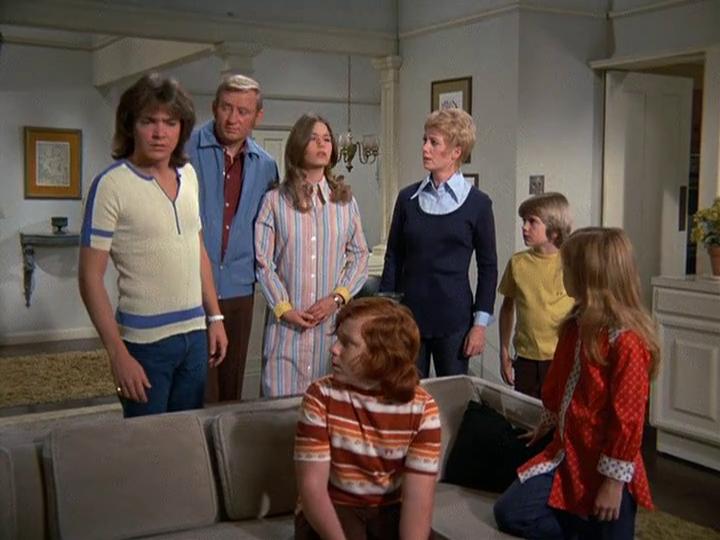
The ache of a simple question: when love starts to drift, can tenderness pull it back?
Let’s put the key facts where you can see them. “Am I Losing You” gave The Partridge Family a more fragile kind of hit in the spring of 1972—issued on Bell 45-200 with “If You Ever Go” on the flip, taken from the LP Shopping Bag (released March 1972). Written by L. Russell Brown and Irwin Levine and produced by Wes Farrell, the single spent seven weeks on the Billboard Hot 100, peaking at No. 59 (and No. 36 on Adult Contemporary)—a gentler chart story than the blockbusters, but an honest one for a song that whispers rather than waves. On the album, it sits early—side one, track four—timed at about 2:22–2:23.
What you hear is Brown & Levine returning to the thoughtful lane they’d mapped with “I Woke Up in Love This Morning,” only smaller and closer. The title isn’t a pose; it’s a real-time worry set to melody. The verses arrive like half-finished sentences—soft consonants, little pockets of air—until the chorus brings the question into focus without raising its voice. David Cassidy leans into that scale. He doesn’t belt; he rounds his vowels and leaves just enough space after the hook for the listener’s own memory to step forward. The band follows suit: lightly chiming guitars, a modest rhythm pulse, piano that catches the light and lets it go. Nothing is busy; everything is purposeful. That’s the early-’70s Los Angeles polish Shopping Bag is known for, the kind that keeps a tune legible fifty years later.
The single’s modest numbers don’t tell the whole story; television did the rest. In Season 3 the song is woven into the narrative fabric, surfacing as a featured performance in episodes like “You’re Only Young Twice” and echoing through “Whatever Happened to Keith Partridge?”—the kind of on-screen placement that turned Partridge cuts into weekly rituals. If you first met it under a living-room glow rather than on a turntable, that’s no accident: the show often used tender songs as conversation where talk might fail.
There’s a grown-up wisdom tucked inside the lyric that lands especially well for older ears. “Am I Losing You” isn’t a demand for reassurance or a scene of operatic doubt; it’s the quiet dread that comes after you’ve built a life with someone and notice the tiniest draft under the door. The writers keep to everyday language—the sort we actually use when we’re worried—and that humility is the point. The record doesn’t argue a case; it asks for attention. Cassidy’s phrasing understands the difference. He sings like a person who’s learned that love can be held together by tone as much as by promise, and that sometimes the bravest thing you can do is ask the question out loud.
Placed against its companions on Shopping Bag, the track deepens the album’s emotional palette. Where “It’s One of Those Nights (Yes Love)” offers late-evening ease, “Am I Losing You” is the bedside lamp left on after the conversation—same house, different hour. That contrast is part of why the record endures. The Partridge catalogue gets labeled “bubblegum,” but the craftsmanship here is sturdier than the nickname: arrangements scaled for living rooms and car radios, melodies that carry feeling without theatrics, and a singer who knows when restraint communicates more than bravado.
You can also hear how the production leaves room for memory to do its work. Farrell’s approach keeps the rhythm section uncluttered—a steady, humane pulse rather than a dramatic thump—while the keys and guitars trade small, sympathetic gestures. The mix puts Cassidy squarely in the center, not as a star demanding attention but as a narrator asking for connection. It’s the same studio logic that runs through the group’s hits and their best-of collections: give the vocal room, set the scene, and get out of the way. (Reissues and anthologies keep putting this one forward—proof that, even without a high peak, listeners kept it close.)
If you were there when it was new, you might remember how songs like this one slipped into the week—between homework and dishes, between a show’s laugh track and the closing credits—teaching a small lesson about tenderness. If you’re meeting it now, the lesson holds. “Am I Losing You” is the sound of choosing intimacy over performance, of saying I’m here; are you still with me? and trusting the answer enough to listen for it. In three unhurried minutes the record names a feeling many of us were raised to swallow, then makes space for grace to enter. That’s not a blockbuster’s job. It’s a companion’s.